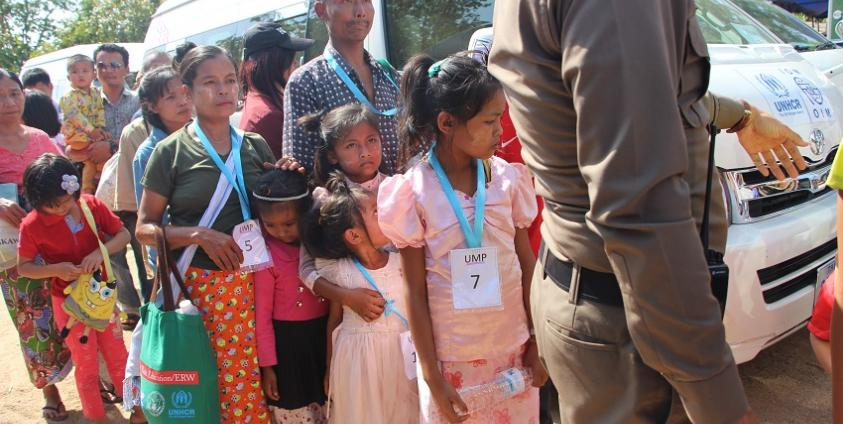The Thai government has transferred 93 Myanmar refugees from five refugee camps to Myanmar government on May 7 under the bilateral agreement on the voluntary repatriation of the refugees from Thailand.
The refugees living in Mae La, Umpiem, Nu Po, Ban Don Yang, and Mai Nai Soi refugee camps have returned under the arrangement of the Thai Ministry of Interior, Thai Ministry of Immigration, and the United Nations High Commissioner for Refugees (UNHCR). The returnees were received at Mae Sot-Myawaddy border gate in the Kayin (Karen) State and Meisei gate in the Kayah (Karenni) State, according to Myanmar Ambassador to Thailand U Myo Myint Than.
“According to the decision set down during the secretarial-level meeting of the two foreign ministries on March 27, 2018, we agreed to transfer 161 refugees, who do not need to be provided with accommodation, out of 190 verified refugees on May 7. We received the latest list of 101 people, who wanted to return home, from the Thai Ministry of Foreign Affairs on May 3. We received 93 people today. Twenty people were transferred from Mae Hong Son in the morning,” U Myo Myint Than said during the welcoming ceremony held in Myawaddy.
The returnees were welcomed by the Kayin State Chief Minister Nan Khin Htwe Myint and state government officials, officials from the Ministry of Social Welfare and Resettlement from respective areas, Myanmar Red Cross Society, and social welfare associations from Myawaddy at the reception center in Kyauk Lone Gyi Pagoda Road in Ward 4 in Myawaddy.
“I’m very happy for their return. Our government will do our best to assist them. Please inform us via respective authorities if [the returnees] face difficulties concerning the health and education of their children. We will do our best to assist them” the Kayin State Chief Minister Nan Khin Htwe Myint told the welcoming ceremony.
Seven transportation groups will take the refugees for their resettlement in the Kayin State, Karenni (Kayah) State and Yangon, Bago, and Sagaing regions.
“I have been living in Thailand for a long time. I have been away from my birthplace for a long time and I wanted to come back here. The camp is receiving lesser aids currently. Also, there are difficulties in working outside the camp to make sufficient earnings for my family. There are difficulties with the children’s education. They have finished the schools there but they couldn’t find any work here,” Saw Tun Win, who returned from Nu Po refugee camp, told KIC News.
The UNHCR said that they will provide aid during the repatriation process via the International Organization for Migration (IOM), and that they will give THB 1,800 to each person for their transportation costs and an additional THB 5,400 for each adult and THB 3,600 for each child.
The UNHCR source explained that the World Food Programme (WFP) will provide each person with THB 2,100 equivalent to six month rations, on their departure, as well as provide mosquito nets, hygiene kit for women, travel bag and documents.
The Ministry of Immigration will issue household lists and national registration cards to the returnees. The Ministry of Social Welfare, Relief and Resettlement will provide every returnee with Ks 100,000 each; Ks 300,000 for families with three members and above and food supplies of one-month ratio via the Disaster Management Department. The Ministry of Border Affairs and Myanmar Red Cross Society have also provided aids during the ceremony.
Since the start of the voluntary repatriation program, the UNCHR and both the Thai and Burma governments have organized the return of 19 households from Nu Po refugee camp on October 26th last year through Mae Sot-Myawaddy border gate. After the second batch of refugees was transferred, arrangements will be made to transfer the third batch of refugees after both countries have cooperated in verifying the nationalities of 129 refugees from the UNHCR’s list on the third week of May, according to U Myo Myint Than.
According to the UNHCR, around 100,000 refugees are living in nine refugee camps along the Thai-Myanmar border. Many refugees said that they are still observing the current political situation in Myanmar and armed conflicts before considering repatriation.








